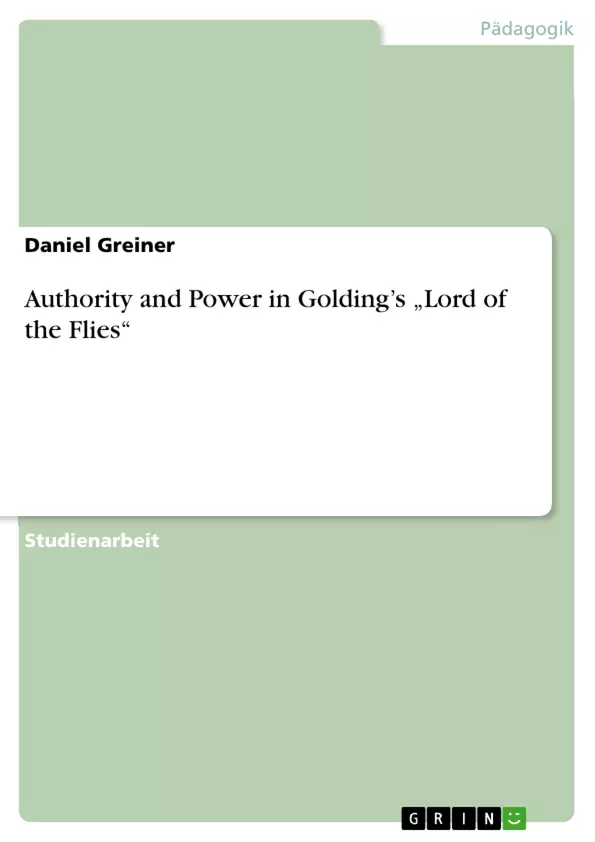William Golding illustrates in his novel Lord of the Flies a very bad image of human mankind. By using children, the apparently most innocent human beings, as the characters of his book, he allows the reader to have a profound view in the human soul and elucidates, simultaneously, essential problems of the society. One of these problems is the permanent fight between different political imaginations and the associated acting of leaders or authorities which is, as history has shown, not always rational. On the contrary, the Second World War, in which Golding was involved as a marine officer, had shown how irrational and cruel authorities are able to act. But even if authorities act irrational, cruel and sadistic, there are always people who follow them, nevertheless, obediently. This syndrome, called Authoritarian Character which describes this behavior, was described and analyzed by philosophers and sociologists of the Frankfurter Schule like Erich Fromm, Theodor Adorno and Max Horkheimer. They extended the theories of Sigmund Freud, and wanted to find out why certain people are susceptible to totalitarian authorities and systems as the boys in Lord of the Flies. Sociologists like Heinrich Popitz also analyzed the strategies which the authoritarian agitators apply in order to subject other people in order to organize them in mass organizations; Strategies which made the people in Germany tolerating a fascistic ideology during the World War. In respect thereof, Golding’s Novel shows a very negative picture of the society and he uses the uninhabited island for the boys as a kind of laboratory to illustrate the development of the human society in a kind of microcosm because the incident on the island are an allusion of the status of the society in this time. This seminar paper will deal with the different types of authorities in Lord of the Flies, with methods above all Jack uses in order to subject the other boys in order to become a totalitarian Leader, and with psychological processes and preconditions that are necessary for developing an authoritarian syndrome. Particularly with regard to Roger who embodies the ideal of an authoritarian personality and a sadist.
Inhaltsverzeichnis
- Introduction
- The Charismatische Herrschaft in Lord of the Flies
- Jack's methods of agitation
- The Authoritarian Personality
- The Mask - the loss of personal responsibility
- Conclusion
- Bibliography
Zielsetzung und Themenschwerpunkte
Diese Seminararbeit untersucht die Darstellung von Autorität und Macht in William Goldings Roman "Lord of the Flies". Der Autor nutzt die Figur der Kinder, um die dunkle Seite der menschlichen Natur aufzuzeigen und die Entwicklung einer totalitären Gesellschaft in einem Mikrokosmos zu demonstrieren. Die Arbeit analysiert die Strategien, die Jack anwendet, um die anderen Jungen zu unterwerfen, und die psychologischen Prädispositionen, die zur Entwicklung eines autoritären Syndroms führen. Des Weiteren werden die politischen und gesellschaftlichen Folgen dieser Entwicklung, wie der Wandel von Demokratie zu Totalitarismus im Rahmen der "charismatischen Herrschaft", die Entstehung einer Massenbewegung und der Verlust der persönlichen Verantwortung und des Gewissens, untersucht.
- Die unterschiedlichen Autoritätstypen in "Lord of the Flies" und deren Auswirkungen
- Jacks Methoden der Mobilisierung und Unterwerfung der anderen Jungen
- Die psychologischen Prädispositionen für autoritäres Verhalten
- Die Entwicklung von Demokratie zu Totalitarismus im Roman
- Die Rolle der "charismatischen Herrschaft" in der Entwicklung der Gesellschaft auf der Insel
Zusammenfassung der Kapitel
Das erste Kapitel analysiert die verschiedenen Autoritätstypen in "Lord of the Flies", insbesondere die Kontraste zwischen Ralphs rationaler und demokratischer Autorität und Jacks irrationaler und totalitärer Autorität. Es werden die Methoden untersucht, mit denen die beiden Jungen ihre Macht ausüben, sowie die psychologischen und gesellschaftlichen Folgen dieser verschiedenen Führungsstile.
Das zweite Kapitel konzentriert sich auf Jack's Methoden der Mobilisierung und Unterwerfung der anderen Jungen. Es wird die Rolle der "charismatischen Herrschaft" in dieser Entwicklung beleuchtet und die Strategien analysiert, die Jack anwendet, um die anderen Jungen für seine Zwecke zu gewinnen. Darüber hinaus werden die psychologischen Prädispositionen für autoritäres Verhalten untersucht, insbesondere in Bezug auf Roger, der als typisches Beispiel für eine autoritäre Persönlichkeit gilt.
Das dritte Kapitel analysiert die Entstehung einer Massenbewegung auf der Insel und die damit verbundenen Folgen, wie den Verlust der persönlichen Verantwortung und des Gewissens. Es werden die konkreten Auswirkungen dieser Entwicklung auf die Jungen und die Inselgesellschaft untersucht.
Schlüsselwörter
Die zentralen Themen und Begriffe, die in dieser Arbeit behandelt werden, umfassen: "Lord of the Flies", Autorität, Macht, Charismatische Herrschaft, Totalitarismus, Demokratie, Autoritäre Persönlichkeit, Mass Movement, Verantwortungsbewusstsein, Gewissen, Mobilisierung, Unterwerfung.
Häufig gestellte Fragen
Welches Menschenbild vermittelt William Golding in "Lord of the Flies"?
Golding zeichnet ein sehr negatives Bild der Menschheit, indem er zeigt, wie selbst scheinbar unschuldige Kinder in einer isolierten Umgebung zu Grausamkeit und Totalitarismus fähig sind.
Was ist der Unterschied zwischen Ralphs und Jacks Autorität?
Ralph verkörpert eine rationale und demokratische Autorität, während Jack eine irrationale, totalitäre und auf "charismatischer Herrschaft" basierende Macht ausübt.
Wie wird das "autoritäre Syndrom" in der Arbeit erklärt?
Unter Rückgriff auf die Frankfurter Schule (Fromm, Adorno, Horkheimer) wird analysiert, warum Menschen anfällig für totalitäre Führer sind und ihre persönliche Verantwortung abgeben.
Welche Rolle spielt die Figur Roger im Roman?
Roger wird als das Ideal einer autoritären Persönlichkeit und als Sadist analysiert, der die Strategien des autoritären Agitators Jack radikal umsetzt.
Was symbolisiert die Maske in der Geschichte?
Die Maske symbolisiert den Verlust der individuellen Identität und der persönlichen Verantwortung, was es den Jungen ermöglicht, ohne Gewissensbisse gewalttätig zu handeln.
- Quote paper
- Daniel Greiner (Author), 2010, Authority and Power in Golding’s „Lord of the Flies“, Munich, GRIN Verlag, https://www.grin.com/document/191472



